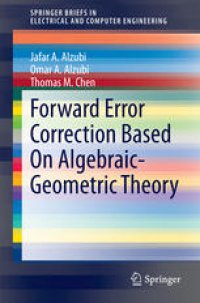
Ebook: Forward Error Correction Based On Algebraic-Geometric Theory
- Tags: Communications Engineering Networks, Coding and Information Theory, Information and Communication Circuits
- Series: SpringerBriefs in Electrical and Computer Engineering
- Year: 2014
- Publisher: Springer International Publishing
- Edition: 1
- Language: English
- pdf
This book covers the design, construction, and implementation of algebraic-geometric codes from Hermitian curves. Matlab simulations of algebraic-geometric codes and Reed-Solomon codes compare their bit error rate using different modulation schemes over additive white Gaussian noise channel model. Simulation results of Algebraic-geometric codes bit error rate performance using quadrature amplitude modulation (16QAM and 64QAM) are presented for the first time and shown to outperform Reed-Solomon codes at various code rates and channel models. The book proposes algebraic-geometric block turbo codes. It also presents simulation results that show an improved bit error rate performance at the cost of high system complexity due to using algebraic-geometric codes and Chase-Pyndiah’s algorithm simultaneously. The book proposes algebraic-geometric irregular block turbo codes (AG-IBTC) to reduce system complexity. Simulation results for AG-IBTCs are presented for the first time.
This book covers the design, construction, and implementation of algebraic-geometric codes from Hermitian curves. Matlab simulations of algebraic-geometric codes and Reed-Solomon codes compare their bit error rate using different modulation schemes over additive white Gaussian noise channel model. Simulation results of Algebraic-geometric codes bit error rate performance using quadrature amplitude modulation (16QAM and 64QAM) are presented for the first time and shown to outperform Reed-Solomon codes at various code rates and channel models. The book proposes algebraic-geometric block turbo codes. It also presents simulation results that show an improved bit error rate performance at the cost of high system complexity due to using algebraic-geometric codes and Chase-Pyndiah’s algorithm simultaneously. The book proposes algebraic-geometric irregular block turbo codes (AG-IBTC) to reduce system complexity. Simulation results for AG-IBTCs are presented for the first time.